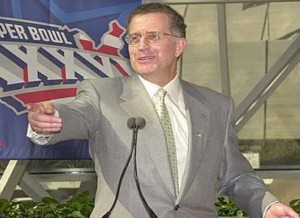 Paul Tagliabue has never found the middle ground of public opinion in more than a decade as the commissioner of the NFL.
Paul Tagliabue has never found the middle ground of public opinion in more than a decade as the commissioner of the NFL.He has ardent supporters. He has vehement detractors. When he steps down in July, he will be missed by many, and bade good riddance by others.
That probably comes with the territory when you consider he's presided over a league that sometimes seemed bipolar during his tenure.
There have been unquestionable high points: TV revenues have skyrocketed, a salary cap was implemented and the NFL handled the advent of free agency better than baseball might ever hope to. A financially-level playing field has been achieved through the cap and revenue sharing, a field that allows the micro-market Green Bay Packers to compete with the big boys on the East Coast.
Fans pack stadiums in record numbers, buy tons of merchandise and fawn over star players. The NFL Network was established several years ago, ramping up the NFL's global profile even more. The Super Bowl is now a weeklong event, with the game serving merely as the punctuation.
In short, the NFL is star-quality, rolling in dough and rivaled only by the NBA as the most successful major sports league in North America. It all happened on Tagliabue's watch.
But the league delivered itself a major black eye during Tagliabue's tenure as well. And the commissioner was part of the problem.
In 1993, the NFL could have placed expansion franchises in football-starved St. Louis and Baltimore. Instead, Tagliabue helped steer the franchises to a pair of untested small markets: Charlotte and Jacksonville.
Tagliabue might have had expanding the league's coverage on his mind when he aimed at North Carolina and northeast Florida, but he helped set in motion a chain of events that blackened the league's image to many fans for years.
Without expansion franchises, St. Louis and Baltimore were left to lure existing franchises. In 1995, Baltimore reeled in a debt-riddled Art Modell and his Cleveland Browns. A year later, St. Louis grabbed the Rams from Los Angeles.
At the same time the Browns bolted for Baltimore, the Oilers moved to Tennessee. At the same time the Rams left Los Angeles, Al Davis packed up and moved his Raiders back to Oakland.
The moves left the nation's second-largest market (Los Angeles), another Top 10 market (Houston) and a city with a historically rabid fan base (Cleveland) without teams.
Not since baseball in the 1950s had so many franchises moved in such a short amount of time.
Tagliabue didn't exert his commissioner's authority when the league had the chance to put expansion franchises in the biggest markets available. By not acting, he let the NFL regress to a state of franchise upheaval that normally exists in indoor soccer leagues. For that reason, he will never supplant Pete Rozelle as the greatest NFL commissioner.
But Tagliabue was a benevolent leader. He fought for what he thought was best for the league, whether we agreed with him or not, and for that reason, his tenure should be remembered as a positive one overall.
Locally, Tagliabue recovered from the musical-teams fiasco of the mid-'90s and helped broker a deal that forced Modell to relinquish the name, colors and history of the Browns. That gave birth to the Baltimore Ravens, and spared Clevelanders the indignity of watching the Baltimore Browns take the field. He then worked to award Cleveland an expansion franchise for the 1999 season.
In 2002, a new Houston franchise took the field, meaning Los Angeles is the only city Tagliabue will leave without a team. There is some speculation as to how much impetus the "bring the NFL back to L.A." movement has, anyway.
Tagliabue has had Everest highs and Death Valley lows as a commissioner. For better or worse, he impacted the league in an indelible way, and will leave it, by and large, in better condition that he started with. And that's the primary job for any commissioner.
No comments:
Post a Comment